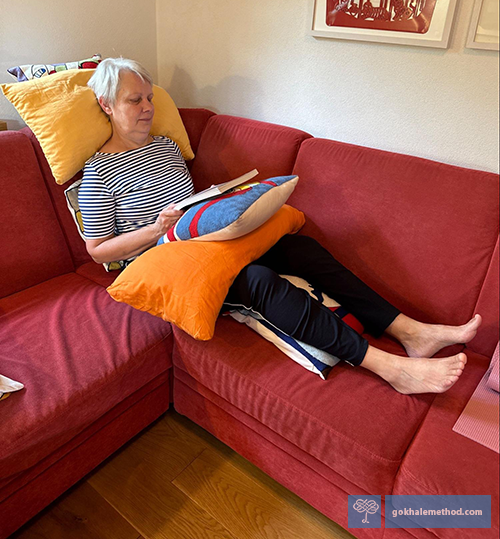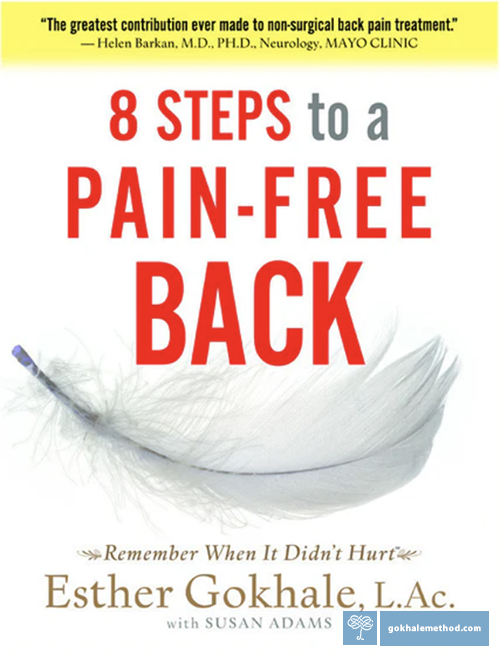Aha Moments in Healthy Posture
The Gokhale Method® is designed to be, well, methodical. But although the process of learning healthy posture is mostly systematic and progressive, it is also usually punctuated by “aha moments”. These glimpses of intellectual, visual, and kinesthetic understanding of the body can arrive like the warm glow of returning to home ground, or they can be seismic shifts that change your life forever…
Having an aha moment makes most people’s posture journey exciting, and sometimes profound. This blog post shares some student experiences and reflections on their discoveries.
David Samuels got out of constant sciatic pain while taking Gokhale Foundations with teacher Amy Smith. For David, learning to bend well was a revelation.
Aha! The moment when the mind relaxes…
With aha moments we are often talking about cognition that differs from the slow burn of incremental learning. It’s a flash of insight—somewhat like a lightbulb coming on. In “The Power of Now,” Eckhart Tolle’s bestselling book on meditation, he describes how his mind finally shifted out of a period of intensely stressed and anxious overthinking. His mind finally gave way one day to a state of peace, clarity, and insight.
Stress and anxiety are not intended to be a part of our learning process, but I think a similar mechanism sometimes plays out. Students are often very conscientious and expect to master a lot of material in a short time—this expectation can overwhelm the mind. The mind loves to learn with firm foundations and linear, logical steps, but it can get overloaded. When it lets go, it can sometimes make connections spontaneously. Aha.
Nancy Sullivan was amazed to learn she could resolve her lifelong headaches herself with Gokhale Method teacher Aurelia Vaicekauskas.
Eminent violinist Kala Ramnath could scarcely believe her back pain had really gone after years of suffering.
Embracing change for the better
Heike Eschbach is a retired midwife and lives in Germany. She had suffered with back pain and sciatica for many years, and, while taking the Foundations course with Julie Johnson, was able to reduce her pain medication by two-thirds.
Learning about the benefits of a J-spine, a well-positioned pelvis, and external rotation in her hips, have been just some of the posture principles that are bringing healthy changes to Heike’s body. For her, learning how to relax and read in comfort was a breakthrough—the realization that healthy posture holds the key to resolving her pain. Heike wrote to us:
The new movement patterns I’ve learned integrate wonderfully into my everyday life. I am now also noticing improvement in my cervical spine and shoulders. I'm very happy about that.

Aha moments can be profoundly relaxed and comfortable—it just takes know-how to get there. Heike is embodying numerous posture principles that arrange her spine and body well as she relaxes on the sofa to read.
Posture breakthroughs are a state of mind, as well as body
It is not surprising that the majority of our students are delighted to find solutions to physical issues, whether that be to address pain, improve appearance, or more generally for self-optimization and future-proofing. But they often find, at some point, that changing their posture also impacts the way they feel about themselves and the world around them.
Below is a heartfelt account from a British student, Lavinia, from Milton Keynes, who wrote:
My whole life has been blighted by BIG bosoms! To the extent that I have become excessively round shouldered and as soon as I am in a new environment with people all around me, the shoulders come forward and my tortoise shell envelops me in order to hide those which I detest!
Well, I read the book, listened to Esther online, and attended a Foundations class. What bosoms? I’m so busy perfecting a lovely straight back I have forgotten all about them. Who cares anyway? My neighbour has noticed my back is so much straighter, things are changing for the better. I intend to keep up the good work. I feel like a new woman!
Finding our natural uprightness and height in a relaxed and comfortable way not only gives us the space our spine and other structures crave, it often liberates our personality and self-confidence too.
Professional cellist Katie Rietman discovered greater freedom through learning the Gokhale Method with Julie Johnson, both in her neck, and her confidence.
Aha moments can turn students into teachers
Most Gokhale Method teachers can clearly recall their first aha moments too! Clare Chapman, a teacher in the UK, tells how she initially encountered the Gokhale Method through my book:
One of my yoga students, who knew I was interested in solutions to back pain, lent me 8 Steps to a Pain-Free Back. As she handed me the book, to be honest, being a somewhat sceptical Brit, I thought this was probably just another “easy steps” self-help book that would promise the earth and fall far short. But within a few pages I was compelled to read more.
The next few days and chapters brought repeated aha moments. My understanding of the body, back pain, and posture, shifted into a new paradigm. Within weeks I knew I wanted to learn more and teach these principles. My aha moments may have slowed down a bit, but are still happening 14 years on…

Self-help steps, principles that challenge the conventional wisdom on back pain, and hundreds of compelling illustrations, bring aha moments for many readers.
Best next action steps
If you would like to discover your aha posture moments, get started by booking a consultation, online or in person, with one of our teachers.
You can sign up below to join any one of our upcoming FREE Online Workshops…

Comments
Thanks for the article. I
Thanks for the article. I love listening to peoples "aha moments."
I couldn't agree more about needing to be relaxed when practicing the Gokhale Method. My "aha" moment came listening to Esther on NPR in 2015 while I was taking a steam shower. The fact that she was worried about arm position was all I needed to hear since I had two untreated shoulder injuries and an untreated mid back injury that I had no success fixing to my satisfaction.
Since I had spent four years in the 90s bodybuilding, extrapolating what bean shaping would mean to my skeletal system was all I needed to set about fixing my shoulders and back despite the 43 years that had elapsed between the time of my shoulder and back injuries and discovering the GM.
I appreciate the "a ha" moments that point out the mis-alignment in my skeletal system most of all. For me, those insights are much more important than the positive "a ha" moments since it alleviates the pressure of trying to beat a dead horse until the timing is right. Nothing is more enervating than trying to do the impossible.
Once you identify the problem, you're halfway there. Then you can set up long, medium, and short range goals for that body part or quadrant which give you positive reinforcement every step of the way since you're not trying to push your body to do something that it is not capable of doing at that time. Don't put the cart before the horse.
I am a great believer in yoga nidra--it worked wonders for me when I was unable to put full weight on my left leg for three months when I broke my pelvis--much more difficult than rehabbing from my hip replacement.
I have been doing Lang's class religiously for three years, simply doing the breathing exercises and greatly modifying the Asana or doing it in my mind until it is possible to do them with proper alignment.
I am most grateful that the GM has allowed me to undo so many bad habits in such a logical way. My mantra has always been, "never let Western medicine interfere with your self healing." and the GM is it perfect vehicle for doing just that. Despite four major injuries since discovering the GM it keeps getting better and better. As always, thank you for the logic.
Thank you for uploading the
Thank you for uploading the photo, Mary, that's priceless! Let's hope more readers send in their pictures :-)
Thanks, Clare...I didn't
Thanks, Clare...I didn't expect it to be so big...maybe there's a way to make smaller...??
Hi Mary,What a great photo! I
Hi Mary,
What a great photo! I’ve resized it for you.
Best,
Kresyl - Customer Support
Add New Comment
Login to add commment
Login